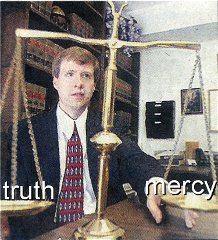Pro Bono Philosophy of the 16th Judicial Circuit Court
 The judiciary of the 16th Judicial Circuit recently announced a formal philosophy on the importance of pro bono. Since the inception of law it has always been the affirmative duty of attorneys to serve the public, and attorneys have always answered this call.
The judiciary of the 16th Judicial Circuit recently announced a formal philosophy on the importance of pro bono. Since the inception of law it has always been the affirmative duty of attorneys to serve the public, and attorneys have always answered this call.
Attorneys serve in government, community boards, education, churches and other civic organizations. They give of their time and resources in many endeavors. One unique way attorneys serve the public is through providing free legal service to those of low-income who otherwise would have no access to justice. Many attorneys undertake such representation without applause or accolades. They serve because they know the special duty they have toward the poor and vulnerable. They serve because their faith informs their actions. They serve because they know that our nation is only as strong as its weakest link.
The Pro Bono Philosophy statement is not something new. Rather it is an official affirmation and recognition of the service performed by many attorneys who volunteer through Administer Justice, Prairie State Legal Services and through other means. We join the statemement in applauding the tireless efforts of many attorneys who represent the true ends of justice through pro bono service. We hope others will join with them in this important service.
The statement reads as follows:
With the burgeoning population of the public unable to qualify for legal aid due to income level or attorney conflict, yet unable to afford to hire an attorney, the 16th Judicial Circuit recognizes the deep need for pro bono services. In supporting pro bono volunteer efforts, the court bolsters the effective and efficient use of the legal system making the overall system more productive. Pro bono services create a positive interaction between the public and the court system.
In illustration of the 16th Judicial Circuits support of pro bono volunteer efforts, we encourage all judges and court personnel to not only be sensitive of the attorneys time and efforts in handling pro bono cases but to actively assist them in making the court transactions as conducive to their schedules as possible. In volunteering their professional expertise at no cost, attorneys are acting for us all as ambassadors to the legal profession.
Some ways in which we may encourage, enhance, and help create a culture of pro bono volunteerism may include, but not be limited to:
- Have the circuit clerk alert us to pro bono cases
- Visually identify the files as pro bono
- Ask if there are any pro bono cases before beginning the court call
- Be sensitive to the time of pro bono attorneys by considering scheduling priority of pro bono cases
- Publicly champion and encourage attorneys to abide by the Rules of Professional Conduct preamble: "Service in the public interest may take many forms. These include but are not limited to pro bono representation of persons unable to pay for legal services and assistance in the organized bar's efforts at law reform. An individual lawyer's efforts in these areas is evidence of the lawyer's good character and fitness to practice law, and the efforts of the bar as a whole are essential to the bar's maintenance of professionalism."
 Left to right: Marcie Heston, Prairie State Legal Services; Judge Susan Boles announcing the philosophy statement; Patrick Kinnally, former President of Kane County Bar Association and Julie Cibulskis, incoming president of the bar association. The announcement took place at the Kane County Law Library.
Left to right: Marcie Heston, Prairie State Legal Services; Judge Susan Boles announcing the philosophy statement; Patrick Kinnally, former President of Kane County Bar Association and Julie Cibulskis, incoming president of the bar association. The announcement took place at the Kane County Law Library.




